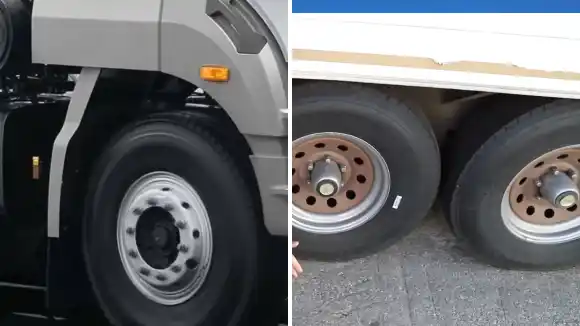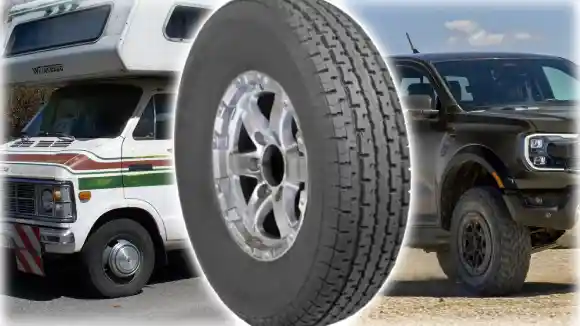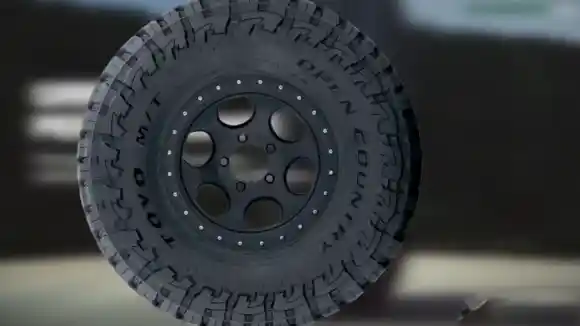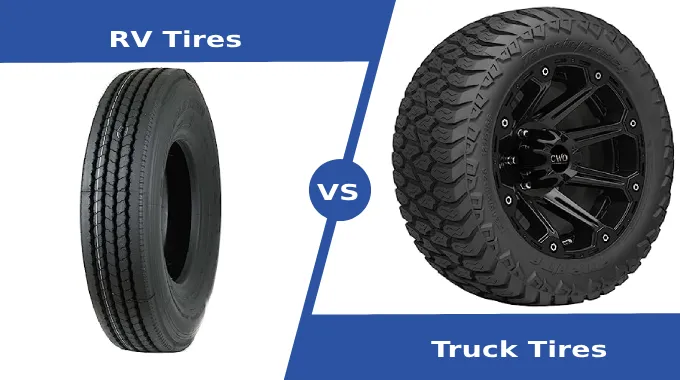Last Updated on September 18, 2023
When choosing tires for your vehicle, it can be difficult to sort through all the available options. If you’re deciding between RV tires and truck tires, understand their differences, as each type of tire is designed for specific purposes.
Typically RV tires have shallower tread depth for better fuel efficiency, while truck tires have deeper treads for improved traction and durability. Also, RV tires have softer but thicker sidewalls for a smoother ride, while truck tires have stiffer sidewalls for increased stability.
Today, we’ll look at the differences between RV and truck tires and help you determine which type best suits your needs. So, if you need clarification about which type of tire is right for your vehicle, keep reading for a burst of helpful information to make an informed decision.
Key Differences Between RV Tires and Truck Tires

Regarding RV tires and truck tires, there are several key differences to consider. But load capacity is a major factor. RV tires are designed to carry the weight of the entire vehicle and its contents, while truck tires are typically built to handle heavy loads and towing.
- Load Capacity Differences
- Tread Pattern Variations
- Sidewall Stiffness Contrast
- Speed Rating Variances
- Handling Characteristics Disparities
- Durability and Longevity
- Tire Pressure Requirements
- Heat Resistance Variances
- Price Differences
Load Capacity Differences
If you’re driving a truck, you’ll need tires that can handle heavy loads like a champ. Load capacity is one of the most significant differences between RV and truck tires.
Truck tires are designed to carry heavy loads, while RV tires are built to support the weight of the vehicle and its contents. But remember that a tire’s load capacity is determined by size and construction.
Truck tires typically have a higher load rating than RV tires, allowing them to carry more weight. This is important for trucks that are used for hauling heavy loads or towing trailers.
RV tires, meanwhile, are designed to provide a smooth and comfortable ride for the occupants of the vehicle. While they may not have the same load capacity as truck tires, they can still support the RV’s weight and contents.
Tread Pattern Variations
Regarding RV tires & truck tires, the tread pattern can make a big difference in how well the tires grip the road and handle different conditions. On long trips, RV tires typically have a more highway-oriented tread pattern for stability and comfort.
Conversely, truck tires usually have an aggressive tread layout, with deeper grooves and larger lugs to provide better traction off-road. This makes them ideal for tackling rough terrain and challenging driving conditions.
There are also all-terrain options available for RVs, which offer a compromise between highway and off-road capabilities.
Sidewall Stiffness Contrast
RV tires typically have a softer and thicker sidewall, allowing for more flexibility and a smoother ride. This can be beneficial for long-distance travel and provides a comfortable experience for passengers.
Truck tires have a stiffer sidewall, offering better stability and handling, especially when carrying heavy loads or towing. The increased sidewall stiffness of truck tires helps to prevent excessive sway and improves overall control.
Speed Rating Variances

When it comes to speed, RV tires and truck tires have some key differences that you need to know. RV tires typically have lower speed ratings compared to truck tires. RVs are designed for comfort and stability rather than high-speed performance.
Truck tires, however, are built to handle heavy loads and higher speeds. They often have higher speed ratings, allowing for a smoother and faster ride. Match your tires’ speed rating to your vehicle’s maximum speed capabilities. This ensures optimal performance and safety on the road.
Handling Characteristics Disparities
RV tires are designed to provide stability and control, especially when maneuvering larger vehicles. They typically have a stiffer sidewall, which helps to minimize sway and improve handling on uneven surfaces.
In contrast, truck tires are built to handle weights and rough terrains. They offer excellent traction and grip, allowing for better control in off-road conditions. Also, truck tires often have a more aggressive tread pattern, enhancing their performance on dirt, gravel, and mud.
Durability and Longevity
Truck tires have the upper hand over RV tires when considering durability and longevity. They are designed to handle the heavy loads and rough terrains that trucks encounter. Truck tires are built with reinforced sidewalls and stronger tread compounds, allowing them to endure the constant stress and strain of long hauls.
Conversely, RV tires are designed for stability and comfort rather than durability. While they may provide a smooth ride, they are less resilient than truck tires and may wear down faster, especially if subjected to frequent travel or harsh road conditions.
Tire Pressure Requirements
Regarding tire pressure requirements, both RV tires and truck tires have specific guidelines that must be followed for optimal performance and safety. It is crucial to understand these requirements to ensure your tires’ longevity and prevent any potential accidents on the road.
To help you understand the tire pressure requirements for RV and truck tires, check out this table:
| Tire Type | Recommended Pressure Range | Maximum Load Capacity |
| RV Tires | 80-100 psi | Varies |
| Truck Tires | 80-110 psi | Varies |
Heat Resistance Variances
Heat can significantly impact the lifespan and overall performance of your tires, especially on RV and truck tires.
RV tires are designed to withstand prolonged exposure to high temperatures, as they’re often used for long-distance travel. The sidewalls of RV tires are typically reinforced to handle the additional weight and strain of carrying heavy loads.
Meanwhile, truck tires are built to handle demanding conditions, including high temperatures caused by heavy-duty hauling and towing. The tread patterns of truck tires are designed to provide better traction and dissipate heat more effectively.
Price Differences
There are notable price variations between these tires. RV tires tend to be more expensive compared to truck tires. This is primarily due to the requirements and features needed for RV tires.
RV tires are designed to handle the additional weight and load of the vehicle and provide stability and durability for long-distance travel.
Conversely, truck tires are built to withstand heavy loads and different road conditions. To give you an idea of the price variance, here’s a comparison table:
| Type of Tire | Price Range |
| RV Tires | $200-$600 |
| Truck Tires | $100-$400 |
Are RV tires the same as truck tires?

Unlike truck tires, RV tires are engineered to handle the weight and demands of your journey so that you can cruise down the open road in comfort. Here are two reasons RV tires are not the same as truck tires:
- Thicker and stronger sidewalls: RV tires are built with thicker and stronger sidewalls to withstand the additional weight and stress of carrying a fully loaded RV. This ensures better stability and minimizes the risk of blowouts.
- Specialized tread patterns: RV tires feature specialized tread patterns that provide better traction and control on various road surfaces. This is crucial for ensuring a safe and comfortable ride in your RV.
Why are RV tires so expensive?
RV tires are specifically designed to handle the unique demands of recreational vehicles. So they must withstand the weight of the RV, which can be considerably heavier than a truck, and maintain stability and durability.
Also, RV tires are subjected to different forces and conditions than regular truck tires. They are exposed to more UV rays, which can deteriorate the rubber faster, and they need to withstand higher speeds on highways.
Moreover, the manufacturing process for RV tires involves specialized materials and construction techniques, contributing to the higher cost. All these factors combined contribute to the higher price tag of RV tires than truck tires.
Should I run my RV tires at the highest psi?
Running your RV tires at the highest PSI is like driving on a razor’s edge, risking potential damage and compromising safety. While it may seem logical to inflate your tires to the highest recommended pressure, remember that exceeding the maximum PSI rating imprinted on the sidewall can have serious consequences.
Overinflated tires can lead to a harsh ride, decreased traction, and uneven wear, ultimately reducing the lifespan of your tires. Also, running your RV tires at too high a pressure can strain the sidewalls excessively, increasing the risk of blowouts.
Can I use truck tires on an RV?
While it is possible to use truck tires on an RV, it depends on the type of RV and truck tires. RV tires and truck tires have distinct characteristics designed for different purposes.
Trailer tires (ST) are specifically designed for trailers to prevent swaying and provide a higher load capacity. Conversely, commercial truck tires are designed to handle the demands of heavy-duty use on trucks.
Motorhome RVs may benefit from using commercial truck tires due to their durability and load capacity. However, consult with a professional to determine the best tire option for your specific RV model and usage.
To help you better understand the differences between these tires, let’s take a look at the following table:
| RV Tires | Truck Tires |
| Designed for RV usage | Designed for heavy-duty trucks |
| Sidewalls designed to prevent swaying | Durable construction for demanding use |
| Lower load capacity | Higher load capacity |
| Optimized for comfort and stability | Built for durability and longevity |
| Available in various sizes for different RV models | Limited sizes and options |
Can I put light truck tires on my camper?

Putting light truck tires on your camper can provide added durability and load capacity, ensuring a smoother and more enjoyable camping experience. LT, or Light Truck, tires are perfectly safe and acceptable replacements for ST, or Special Trailer, tires.
These tires are designed to withstand the mass and demands of trucks, making them well-suited for campers. Light truck tires offer superior strength and durability, allowing them to handle rough terrains and heavy loads with ease.
They also provide better traction and stability, enhancing the overall safety and control of your camper. A LT tire lasts longer than a ST tire, so you don’t have to replace them as often.
How many miles do most truck tires last?
When you drive your truck cautiously and take proper care of your tires, you can expect them to last for many miles before needing replacement, typically around the 55,000-mile mark. It’s because truck tires are designed to be durable and withstand rough roads and heavy loads.
To ensure the longevity of your truck tires, it is important to regularly check the tire pressure, rotate them every 5,000 to 7,000 miles, and maintain proper alignment. Additionally, avoiding harsh braking and accelerating can help minimize wear and tear.
How often do truck tires need to be replaced?
Regarding the lifespan of truck tires, consider factors such as usage, road conditions, and maintenance. As mentioned earlier, the average lifespan of a semi-truck tire is between three to six years, provided they are in good condition.
However, note that tires should be kept on your vehicle for up to six years. Regular inspections and maintenance are essential to ensure the safety and performance of your truck tires. Experts recommend replacing your tires in sets, as uneven treads can result in a rougher ride.
How fast can you drive on RV tires?
When hitting the open road with your recreational vehicle, have you ever wondered how fast you can push those wheels to go? Well, for most tires on motorhomes, the maximum speed limit is 75 mph.
But note that for fifth-wheels and travel trailers, the speed rating could be lower, ranging from 60 to 65 mph. While exceeding the speed rating of a tire won’t necessarily cause it to explode, it can lead to increased wear and tear, reduced traction, and a higher risk of blowouts.
To ensure optimal safety and performance, it’s recommended to adhere to the speed limits specified for your RV tires.
RV Tires or Truck Tires: Choose the Perfect Tire to Maximize Your Vehicle’s Potential
Choosing between RV and truck tires can be tough, but understanding their differences can make the decision much easier. From tread depth to sidewall construction to speed ratings, there are various factors to consider when selecting the right type of tire for your vehicle.
Ultimately, the type of tire that is best for you will depend on your specific needs and driving habits. Whether planning a road trip in your RV or using your truck for heavy-duty work, you can’t go wrong with a high-quality tire.
So, take some time to research your options and choose a tire that will help you get the most out of your vehicle. And if you ever need help deciding, don’t hesitate to contact a professional for guidance; they’ll be happy to help you make the right choice.



